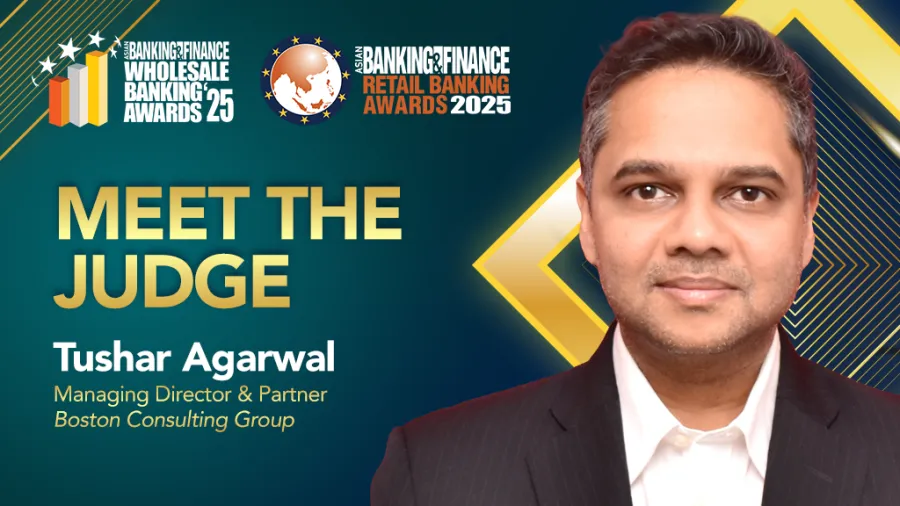
BCG’s Tushar Agarwal emphasises that transformation relies on mobilising people and understanding their motivations
He highlights the importance of cultural context, workforce mobilisation, and data-driven strategies in financial sector innovation.
With rapid technological advancement, shifting customer expectations, and evolving regulatory frameworks, financial institutions across Asia Pacific are under growing pressure to transform. At the forefront of guiding this change are seasoned consultants who help navigate complexity, unlock value, and drive sustainable impact.
Offering valuable insights is Tushar Agarwal, Managing Director and Partner at Boston Consulting Group (BCG). He is a core member of the Financial Institutions practice, where he specialises in large-scale transformations, transaction banking, revenue productivity, cost takeout, and balance sheet optimisation, with a focus on value-based large-scale turnaround programmes across Asia Pacific.
He has advised banks, asset managers, payment providers, and financial regulators across Southeast Asia, particularly in Indonesia. Agarwal co-leads BCG’s TURN/transformation agenda for financial institutions in the region, and also leads the CCIB (wholesale and transaction banking) topic and the CFO Excellence Program in Asia Pacific.
As a judge at the Asian Banking & Finance 2025, Agarwal discussed transformation strategies, regional nuances, and emerging trends in the financial sector, drawing from his extensive experience working with leading institutions across Southeast Asia.
Can you tell us about your journey into consulting and what drew you to the financial institutions space?
I was drawn to consulting soon after my MBA, due to the proposition of having a platform where I get to work with some of the leading organisations in Southeast Asia on their most important problems. I have always thought of myself as a “Curious Explorer,” and every new problem statement was a challenge to be resolved. For Financial services, it has always been close to my heart from my personal interest in financial markets, and the start of my career at Citibank and Deutsche Bank.
Having led turnaround programmes for financial institutions, what, for you, are the key components of a successful transformation strategy in Asia Pacific?
At the risk of sounding something moralistic, I would say three things: Alignment of all senior management from a KPIs measure to soft measures towards the same goals and metrics; willingness to dramatically infuse new skills within existing workforce and/or bring in new capabilities/resources; and persistence in accelerated execution via weekly cadence and checkpoints on all initiatives.
How do cultural, regulatory, or market differences influence your approach in different countries across Asia Pacific?
Very much so, especially with the stark ways of working in every country. Transformation is about mobilising the workforce, so it is essential to leverage people’s strengths and what resonates with motivation in every country. Some countries over-index on process/workplan, some on output measures, and others on input measures.
What are some emerging trends or innovations you believe will reshape transaction banking and asset management over the next five years?
Beyond the standard trends on Fee-compression, D2C to customers, digitisation etc., I believe three keys things that will significantly reshape the industry in 5 years is: Deeper use of data for advisory, forecasting, personalisation to risk management, especially with AI/ML evolution; real-time requirements across all from payments, reporting, execution of trades; and integrated Collaborations w/ partners network through Embedded finance, ecosystems, fintech needs.
How do you see the role of consultants evolving in helping financial institutions remain competitive and compliant in a rapidly changing environment?
Consultants will still be very much involved in bringing about the change management and the organisational adaptability towards the new tech ideas. We believe in the 10-20-70 rule, where 10% is the design and development of the models, 20% is the tech expertise to enable infrastructure, but 70% is getting the organisation mobilised to adopt the new ways of working for delivering the results. Consultants would be needed for the 70%.
As a judge for the Asian Banking & Finance Awards 2025, what specific criteria do you consider impactful when assessing the innovative entries submitted by companies?
A few: level of innovation that the FIs are bringing to the market that they operate in (what problem it is solving); impact from the innovation that they have delivered as an organisation to their shareholders through differentiation; and is it/can it be scalable?



















 Advertise
Advertise












